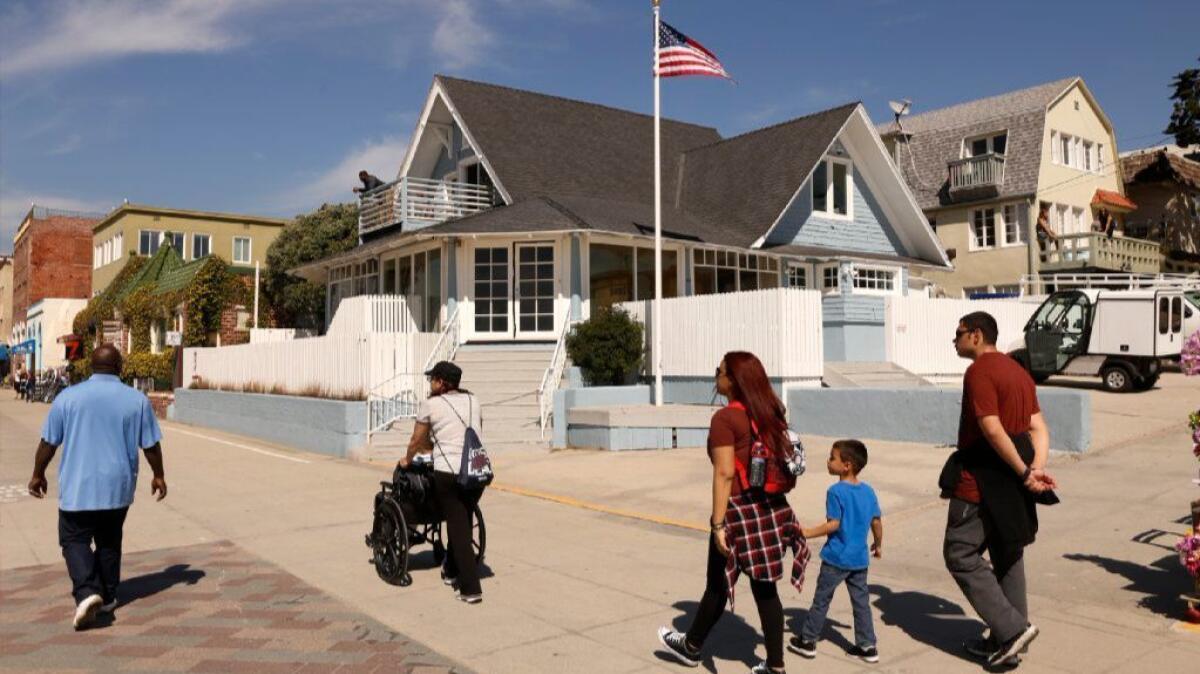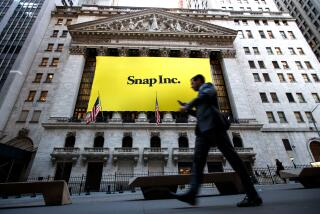Snap Inc. puts more than half its Venice office space up for lease, ending an era

- Share via
When Snapchat was housed in a sky blue beachfront bungalow on the Venice boardwalk, fans of the fledgling disappearing-video app used to take selfies in front of the company’s now famous ghost logo.
Evan Spiegel, the company’s founder and chief executive, could walk out onto the promenade, talk to his users, and channel the neighborhood’s hip appeal into his fledgling app.
That was six years ago, before the company now known as Snap Inc. launched a $3.4-billion initial public offering in March and grew so big it became a punching bag for local residents and businesses who blamed it for changing Venice’s character.
In a move that was long anticipated, Snap said it put more than half of its Venice office space up for lease last week so that it can consolidate hundreds of employees inside a corporate office park next to Santa Monica Airport.
The move, which was first reported by real estate data provider CoStar, encompasses just under 163,000 square feet of real estate in 14 locations, Snap said.
The biggest spaces Snap is putting up for lease include two neighboring structures at 619 and 701 Ocean Front Walk totaling 44,887 square feet, the company said.
Snap is leasing an additional 29,596 square feet nearby at 909 and 913 Ocean Front Walk. It’s also leasing more than 28,000 square feet of combined space at three locations on Abbot Kinney Boulevard. Smaller leases are available on Brooks Avenue and Main and Market streets.
Spiegel and the rest of the executive team will remain at the company’s headquarters at 63 Market Street. Although Snap intends to always keep some offices in Venice, it expects to have more employees in Santa Monica than in Venice by the middle of the year.
“While we are looking forward to bringing teams closer together in Santa Monica, Venice is a magical place and we’re so grateful to have started and grown our company here,” the company said in a statement Wednesday.
The move had been expected ever since the company signed a long-term lease for 300,000 square feet of space at Santa Monica Business Park early last year.
The release of more than 160,000 square feet would raise office vacancy in Venice — one of the most desirable office markets in the region — from about 8% to nearly 20%, local brokers say.
And even though average asking rents of about $6.50 per square foot per month are even higher than they are in pricey Santa Monica, there should be no lack of interest in space vacated by Snap, said real estate broker David Freitag of CBRE.
“I have no doubt but there is going to be a lot of excitement and energy about this product coming to market,” Freitag said. “I think it will be gobbled up very quickly.”
Freitag expects interest from companies in the tech, media and entertainment sectors. Some of the shops and restaurants Snap turned into office space could also revert to previous uses, he said.
Still, for all that Venice has done to inspire the company, it has also proved to have its limitations. It was a challenge for employees to communicate while spread across a network of office buildings. Neighbors and nearby business owners grew impatient with the presence of Snap’s security guards and company shuttles. Rather than clog Venice’s quaint streets and alleys, they argued, Snapchat belonged in a corporate campus befitting of a multibillion-dollar tech company.
It’s unclear what effect the move will have on Snap’s culture. Its proximity to the beach and one of America’s hippest commercial districts had been part of its appeal. Employees enjoyed meetings on the boardwalk rather than in the boardroom.
“It’s definitely a focus when you move somewhere else. How do you maintain the energy and feel of what Venice naturally provides?” said Rich Raddon, co-chief executive of Zefr, a video advertising start-up that recently left Venice after nearly 10 years in the area for a nearby office closer to Marina del Rey with double the square footage.
“As you mature and grow, you have to take into account things like parking and where employees live,” added Raddon, who is also trying to sublease Zefr’s old 20,000-square-foot headquarters on Abbot Kinney.
As the years passed, it grew more difficult to square Snap’s decision to remain in Venice given its size (it has more than 3,000 employees worldwide). Long gone was the inviting atmosphere of the blue beach house and its big logo. In its place was a sort of bunker mentality in which the famously secretive company refused to clearly mark offices as its own.
“When they became a billion-dollar company, they became more reserved and low-key,” said Billy Gallagher, author of “How to Turn Down a Billion Dollars: The Snapchat Story.”
“They really like Venice, though,” Gallagher added. “It’s always been a creative place where Evan would have meetings on the boardwalk. I do think they got a lot of inspiration there.”
Recognizing the risks of trading in Venice for a mundane business park, Spiegel sent an e-mail to employees urging them to engage more with the public when not in the office (this is in contrast to the company’s more draconian approach to talking with the media).
The move will not end Snap’s charitable work in Venice with groups such as Safe Place for Youth, the company said. The shuttering of the offices also means Snap will reduce the use of its employee shuttles.
Representatives of neighborhood groups critical of Snap’s presence in Venice, including Venice Dogz and Alliance for the Preservation of Venice, did not respond to a request for comment.
Activists had previously organized protests against Snap, accusing the company of driving up rent prices in the neighborhood, and posted Snap shuttle schedules online to highlight the company’s effect on congestion in the area.
Many were concerned Snap’s IPO would result in a slew of new millionaires that would make the previously bohemian neighborhood even more unaffordable. Homes in Venice today are commonly priced in the millions.
Snap remains one of L.A.’s biggest tech companies with a market capitalization of more than $20 billion. Still, it struggled in its first year as a public company, watching its stock price vacillate from a high of $27.09 after its stock debut to a low of $11.83 in August. It’s now hovering just over its $17 IPO price.
Financial filings last week showed that Spiegel received $637.8 million in total compensation last year as a result of the public offering. That was the third-highest annual payout ever for a chief executive, Reuters reported.
Times staff writer Roger Vincent contributed to this report.
Follow me @dhpierson on Twitter







